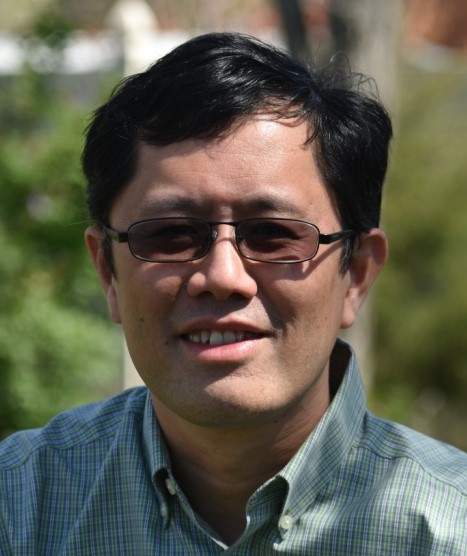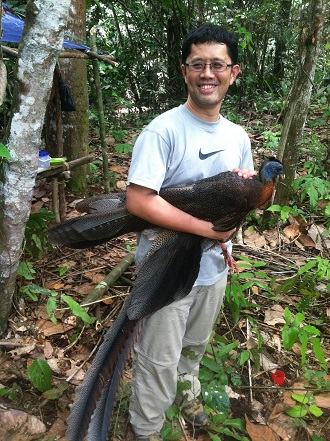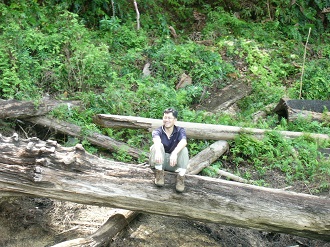About the department:
I am an assistant professor of Biostatistics and Bioinformatics at the Biology department. The department is the second largest in the University in terms of undergraduate population. It has a rapidly growing graduate program, with five new tenure-track faculties hired in the last 3 years. It is highly collegial and interactive, and with GMU located in the greater DC region, we also have plenty of opportunities to interact and collaborate with researchers outside of the campus.
About the research:
I am an evolutionary biologist whose goal is to understand how geographic, ecological and historical drivers interact to create, maintain, and distribute biological diversity at various spatio-temporal scales. My research focus has been on avian phylogenetics, population genetics, speciation and biogeography – especially on birds from tropical Southeast Asia. Members of my lab group use the same evolutionary biology principles, combine them with genomic techniques and computational analyses, to address questions related to pollinator pathogens, animal gut microbiome, management of captive populations, mammalian phylogenetics and adaptation of sparrows to coastal environments.
What has been the biggest challenge as a new PI so far?
Many people have seen the pie chart of time allocation for a postdoc vs a PI. As a PI, my attention gets divided across many more things (the slices of the pie get really, really thin): teaching (and giving partial credits), course design, ordering equipment and kits, grant writing, protocol development, planning projects with students and monitoring progress, etc. Thus, my biggest challenge is to find time to keep up with the latest developments in my fields and be inquisitive.
How do you/will you approach mentoring new lab members?
Every new lab member gets a graduate student primer that contains a combination of a pep talk, expectations (on both the student and the PI), program overview and authorship guidelines. Our program also provides a framework for working out an Individual Development Plan for each student. This makes it a lot easier to lay out the milestones. My mentoring style is to fully equip new students with internal and external resources and know-hows, encourage peer support and not micro-manage.
Do you remember your first publication in Evolution or Evolution Letters (acceptance or rejection)?
My first publication in Evolution was a part of my PhD dissertation. It was hot then to do ecological niche modeling. So, I combined paleoclimatic projections, ecological niche modeling and statistical phylogeography to investigate mechanisms that drove population divergence in SE Asian bird species. I even managed to squeeze the name of one of my heroes - Alfred Russel Wallace - into the title of the paper.
Besides research, how do you promote science?
I try to be involved in projects that have conservation or management implications. For projects related to pollinator resource use and pathogens, we work closely with and explain our science to various stakeholders such as Business School students (who raise funds by selling bee-related goods), landfill operator and elementary school students.
Do you teach evolution? What is the hardest concept to teach?
Yes, I teach Population Genetics, which is essentially microevolution. This is a core course for Mason’s Biocomplexity and Evolution Biology PhD track. I also teach Bioinformatics and Landscape genetics, which are related to the analysis and application of evolutionary biology data.
Do you teach evolution? What concept blows students’ minds?
Probably coalescence and its various complications (eg structured coalescence).
Are you involved in evolution outreach? Tell us about it.
I often give talks to park staff and members of the public when I travel to the tropics to conduct fieldwork. The talks often relate to the biogeographic history of the region through the lens of avian evolution.
How do you think evolutionary research benefits society?
Just as how human society is impacted by human-human interactions at various scales and past events, the natural world is a product of “horizontal” ecological interactions and “vertical” evolutionary history. If members of the public and policy makers want to have a sophisticated understanding of our natural world (e.g. why certain species are “good” reservoirs for viruses, how will communities form or degrade as plants and animals face novel conditions under climate change) in order for human societies to flourish, we will need to understand evolution.
Do you have a time management tip to share?
My tip is to try to mix up the day. This allows one to stay productive through the day by doing various tasks that do not require the same resource (e.g, writing, admin, lab work, replying to email, review papers, grading).
What is your favorite app?
A podcast app (CastBox) and Sudoku/word game for downtime.
Do you have a favorite science podcast or blog?
Science Friday.
What book should every evolutionary biologist read?
Sam Kean’s The Violinist’s Thumb.
What one piece of advice would you give to a starting graduate student?
Think outside the box and explore. Attend lots of seminars and discuss science with peers who different types of research.
What one piece of advice would you give to a postdoc?
Be deliberate about your publications and how your efforts are being attributed in various research you partake in.
How was your first faculty meeting?
It was great – got a warm welcome. A very friendly bunch here at GMU Biology department.
Did you ever have something go wrong in a talk?
Other than the mind going blank? No.
What is something most people don’t know about you?
I want to get a tear drop trailer or boat to travel the country. Maybe the former...
What do you enjoy doing in your free time?
Outdoors stuff like kayaking, birding, mountain biking, hiking.
 Haw Chuan Lim
Haw Chuan Lim
